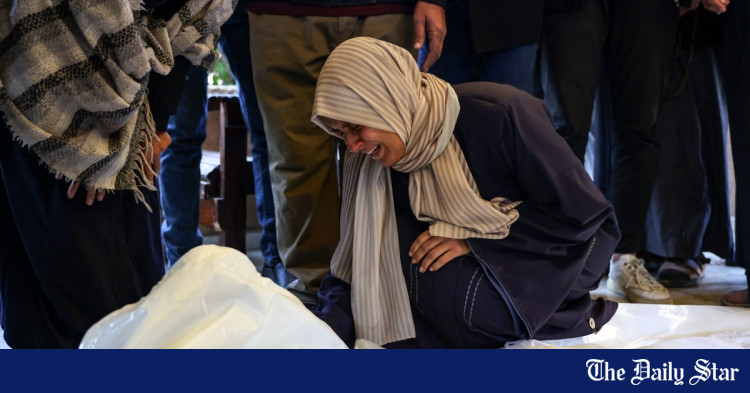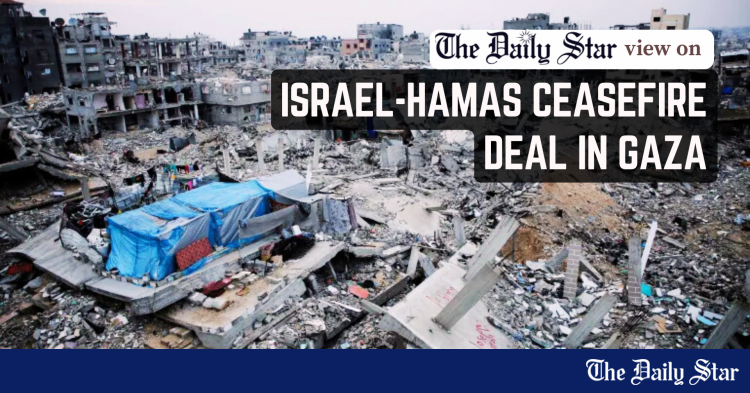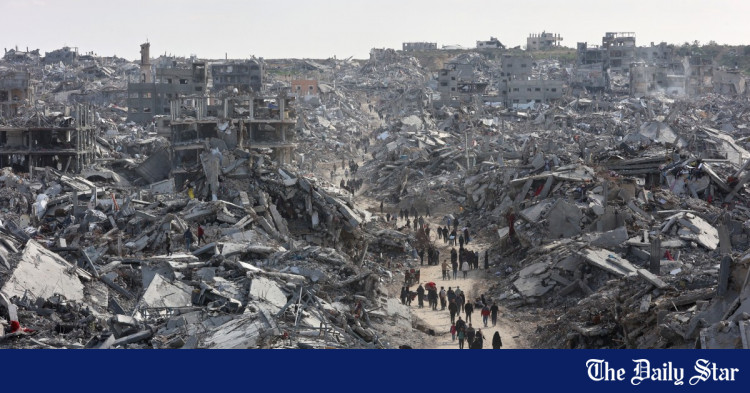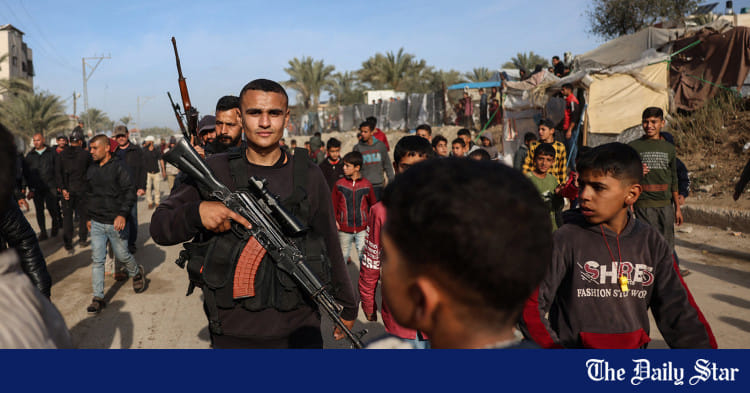Saif
Senior Member
- Joined
- Jan 24, 2024
- Messages
- 15,397
- Reaction score
- 7,874
- Nation

- Residence

- Axis Group


$10 billion needed to rebuild Gaza health system: WHO
At least $10 billion will likely be needed to rebuild Gaza’s devastated health system over the next five to seven years, according an initial World Health Organisation assessment Thursday.
 www.newagebd.net
www.newagebd.net
$10 billion needed to rebuild Gaza health system: WHO
Agence France-Presse . Geneva 17 January, 2025, 22:18

At least $10 billion will likely be needed to rebuild Gaza’s devastated health system over the next five to seven years, according an initial World Health Organisation assessment Thursday.
‘The needs are massive,’ the UN health agency’s representative in the Palestinian territories, Rik Peeperkorn, told reporters.
With a ceasefire finally looming, humanitarians are calling for a dramatic scaling up of humanitarian aid into war-ravaged Gaza, amid efforts to determine the size of the towering needs.
Peeperkorn said his team’s initial estimate of the cost to rebuild just the health sector was ‘even more than $3 billion for the first 1.5 years and then actually $10 billion for the five to seven years’.
‘In Gaza, we all know the destruction is so massive. I have never seen that anywhere else in my life,’ he said.
WHO chief Tedros Adhanom Ghebreyesus meanwhile said ‘less than half of Gaza hospitals are functional’.
He hailed Wednesday’s announcement from mediators that Israel and Hamas had finally reached a truce as ‘just about the best news’.
He voiced hope that ‘this agreement marks the end of the darkest chapter in the history of the relationship between the Israelis and the Palestinians’.
‘We welcome this news with great relief, but also with sorrow that it has come too late for those who have died in the conflict,’ he said.
He also voiced ‘caution, given that we have had false dawns before, and the deal has not yet been confirmed’.
While the mediators said the deal was due to take effect on Sunday, Tedros urged the sides not to wait.
‘If both sides are committed to a ceasefire, it should start immediately,’ he said. ‘The best medicine is peace’.
‘So, let the healing begin, not just for Gaza, but for Israel as well. This is in everyone’s best interest.’
Peeperkorn said the WHO stood ready to ‘expand its support rapidly’ in the territory.
‘What is critical though is that the significant security the political obstacles to delivering aid across Gaza are removed,’ he said.
‘We need a rapid, unhindered and safe access to expedite the flow of aid into and across Gaza.’
Meanwhile, the EU is prepared to redeploy a monitoring mission to the Rafah border crossing between Gaza and Egypt after a ceasefire deal to end Israel’s war in the territory, the bloc’s top diplomat said Friday.
‘We are ready to do it,’ foreign policy chief Kaja Kallas told journalists after meeting Palestinian prime minister Mohammed Mustafa in Brussels.
Kallas said the EU needed an invitation from the Palestinian and Israeli sides and agreement from Egypt before it could ‘go forward’.
The 27-nation bloc set up a civilian mission in 2005 to help monitor the crossing, but that was suspended two years later after militant Islamists Hamas took control of Gaza.
The comments came as Israel’s security cabinet met Friday to vote on a Gaza ceasefire and hostage release deal that should take effect this weekend.
If approved, the agreement would halt fighting and bombardment in Gaza’s deadliest-ever war and initiate on Sunday the release of dozens of hostages held in the territory since Hamas’s October 7, 2023 attack on Israel.
Kallas called the truce deal a “positive breakthrough”, but warned that the road ahead was fraught with potential peril.
“It is still too soon to say whether the war is truly over and we know that there is risk in every step here,” she said.
The EU on Thursday announced a 120 million euros ($123 million) in humanitarian aid for Gaza after the ceasefire deal was struck.
“The European Union will continue to work closely with our partners to deliver humanitarian support,” Kallas said.
The Rafah crossing is a crucial entry into Gaza and Egyptian officials have said talks are underway to reopen it to surge aid into the territory.
The EU monitoring mission would include up to 10 European staff, officials said.
Kallas said that in the longer term the EU was working on a new “multi-year support programme for the Palestinian Authority” and was “ready to assist” in rebuilding Gaza.
Agence France-Presse . Geneva 17 January, 2025, 22:18
At least $10 billion will likely be needed to rebuild Gaza’s devastated health system over the next five to seven years, according an initial World Health Organisation assessment Thursday.
‘The needs are massive,’ the UN health agency’s representative in the Palestinian territories, Rik Peeperkorn, told reporters.
With a ceasefire finally looming, humanitarians are calling for a dramatic scaling up of humanitarian aid into war-ravaged Gaza, amid efforts to determine the size of the towering needs.
Peeperkorn said his team’s initial estimate of the cost to rebuild just the health sector was ‘even more than $3 billion for the first 1.5 years and then actually $10 billion for the five to seven years’.
‘In Gaza, we all know the destruction is so massive. I have never seen that anywhere else in my life,’ he said.
WHO chief Tedros Adhanom Ghebreyesus meanwhile said ‘less than half of Gaza hospitals are functional’.
He hailed Wednesday’s announcement from mediators that Israel and Hamas had finally reached a truce as ‘just about the best news’.
He voiced hope that ‘this agreement marks the end of the darkest chapter in the history of the relationship between the Israelis and the Palestinians’.
‘We welcome this news with great relief, but also with sorrow that it has come too late for those who have died in the conflict,’ he said.
He also voiced ‘caution, given that we have had false dawns before, and the deal has not yet been confirmed’.
While the mediators said the deal was due to take effect on Sunday, Tedros urged the sides not to wait.
‘If both sides are committed to a ceasefire, it should start immediately,’ he said. ‘The best medicine is peace’.
‘So, let the healing begin, not just for Gaza, but for Israel as well. This is in everyone’s best interest.’
Peeperkorn said the WHO stood ready to ‘expand its support rapidly’ in the territory.
‘What is critical though is that the significant security the political obstacles to delivering aid across Gaza are removed,’ he said.
‘We need a rapid, unhindered and safe access to expedite the flow of aid into and across Gaza.’
Meanwhile, the EU is prepared to redeploy a monitoring mission to the Rafah border crossing between Gaza and Egypt after a ceasefire deal to end Israel’s war in the territory, the bloc’s top diplomat said Friday.
‘We are ready to do it,’ foreign policy chief Kaja Kallas told journalists after meeting Palestinian prime minister Mohammed Mustafa in Brussels.
Kallas said the EU needed an invitation from the Palestinian and Israeli sides and agreement from Egypt before it could ‘go forward’.
The 27-nation bloc set up a civilian mission in 2005 to help monitor the crossing, but that was suspended two years later after militant Islamists Hamas took control of Gaza.
The comments came as Israel’s security cabinet met Friday to vote on a Gaza ceasefire and hostage release deal that should take effect this weekend.
If approved, the agreement would halt fighting and bombardment in Gaza’s deadliest-ever war and initiate on Sunday the release of dozens of hostages held in the territory since Hamas’s October 7, 2023 attack on Israel.
Kallas called the truce deal a “positive breakthrough”, but warned that the road ahead was fraught with potential peril.
“It is still too soon to say whether the war is truly over and we know that there is risk in every step here,” she said.
The EU on Thursday announced a 120 million euros ($123 million) in humanitarian aid for Gaza after the ceasefire deal was struck.
“The European Union will continue to work closely with our partners to deliver humanitarian support,” Kallas said.
The Rafah crossing is a crucial entry into Gaza and Egyptian officials have said talks are underway to reopen it to surge aid into the territory.
The EU monitoring mission would include up to 10 European staff, officials said.
Kallas said that in the longer term the EU was working on a new “multi-year support programme for the Palestinian Authority” and was “ready to assist” in rebuilding Gaza.




